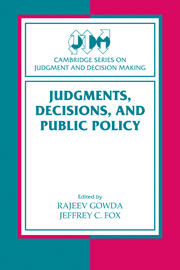Book contents
- Frontmatter
- Contents
- Contributors
- Acknowledgments
- Introduction
- Part I The Fundamentals of Behavioral Decision Theory
- Part II Economic Applications and Contrasts
- Part III Applications to Political and Legal Processes and Institutions
- Part IV Other Policy Applications
- 10 Enhancing the Effectiveness of Innovative Policy Instruments: The Implications of Behavioral Decision Theory for Right-to-Know Policies
- 11 Behavioral Perceptions and Policies Toward the Environment
- 12 The Affect Heuristic: Implications for Understanding and Managing Risk-Induced Stigma
- 13 Enlarging the Pie by Accepting Small Losses for Large Gains
- Part V Commentary and Cautionary Note
- Index
13 - Enlarging the Pie by Accepting Small Losses for Large Gains
Published online by Cambridge University Press: 11 January 2010
- Frontmatter
- Contents
- Contributors
- Acknowledgments
- Introduction
- Part I The Fundamentals of Behavioral Decision Theory
- Part II Economic Applications and Contrasts
- Part III Applications to Political and Legal Processes and Institutions
- Part IV Other Policy Applications
- 10 Enhancing the Effectiveness of Innovative Policy Instruments: The Implications of Behavioral Decision Theory for Right-to-Know Policies
- 11 Behavioral Perceptions and Policies Toward the Environment
- 12 The Affect Heuristic: Implications for Understanding and Managing Risk-Induced Stigma
- 13 Enlarging the Pie by Accepting Small Losses for Large Gains
- Part V Commentary and Cautionary Note
- Index
Summary
A forester named Ben Cone had been managing his land in a sustainable manner for 60 years when the Endangered Species Act (ESA) was passed. Suddenly, Ben faced a real threat. If the government found the red-cockaded woodpecker on his property, it would have the authority to constrain his forestry. Fearing the loss of his forest assets, Ben switched from sustainable management to clear-cutting: He cut down his entire forest. Clearly, this was not the goal of the ESA. The destruction of the forest benefited no one – not Ben Cone, not the environmental groups and politicians who fought for the new legislation, and least of all the red-cockaded woodpecker.
Ben Cone's decision to cut down his forest illustrates what happens when people assume that what is good for others is bad for them. Specifically, Ben viewed any gain for endangered species as an economic loss for him. Rather than seeing opportunities to enlarge the pie of assets, he regarded the pie as fixed in size. In failing to foresee the consequences of the new law, the government failed as well. Although the law allowed negotiations – which might have led to a win-win solution – neither side initiated them.
What can parties in a negotiation do to enlarge the pie of possible solutions? At what level can changes to the way we solve problems be made? We believe change occurs at two levels – how people think and how the government creates policy. These are related. Elected officials think like most citizens.
- Type
- Chapter
- Information
- Judgments, Decisions, and Public Policy , pp. 322 - 352Publisher: Cambridge University PressPrint publication year: 2001
- 1
- Cited by



